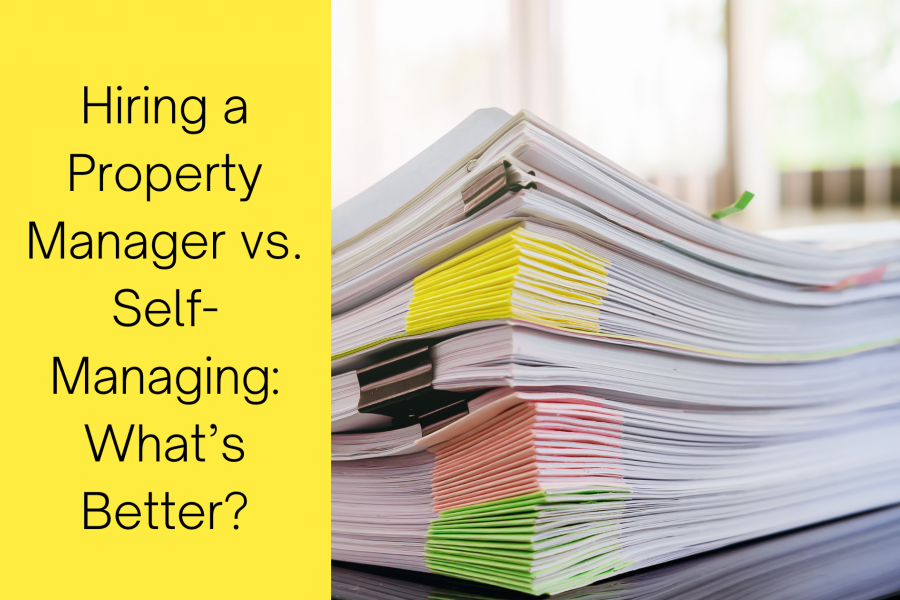
Managing rental property involves many tasks, from dealing with repairs to handling tenant disputes. Landlords often face a choice: manage the property themselves or hire a professional property manager.
Each choice comes with its own advantages and drawbacks. This article, put together by Mark Thomas Properties PM, aims to provide a clear comparison between self-managing and hiring a property manager to help you make an informed decision.
Whether you're a new landlord or have been renting out properties for years, understanding your responsibilities and the benefits of professional property management can make a significant difference. Keep reading to learn more!
Landlord Responsibilities
Being a landlord involves several important tasks that are essential for maintaining a successful rental property. These tasks include:
Managing Vacancies
Finding new tenants when a rental unit becomes vacant is a key responsibility. This includes marketing the property, showing it to prospective tenants, and screening applicants to find reliable renters.
Efficiently handling these tasks reduces the risk of prolonged vacancies and helps maintain consistent cash flow.
Plus, a thorough screening process helps ensure that you select tenants who are more likely to respect the property and adhere to lease terms.
Effective vacancy management minimizes downtime and ensures a steady stream of rental income.

Rent Collection Procedures
Consistent rent collection is vital for maintaining a reliable flow of income. Landlords must establish clear procedures for rent collection, including setting deadlines, accepting payments, and handling late fees.
Consistent rent collection ensures that you can cover property expenses and make a profit.
Upkeep and Repairs
Regular maintenance and prompt repairs are crucial for keeping a property in good condition. As a landlord, you are responsible for addressing issues such as plumbing leaks, electrical problems, and general wear and tear.
Keeping up with maintenance issues ensures that your property remains attractive to tenants and helps prevent more costly repairs down the line.
Enforcing Lease Agreements
The lease agreement specifies the rules and conditions of the rental arrangement.
As a landlord, you must enforce these terms, which may include managing lease renewals, addressing lease violations, and taking appropriate action if tenants do not comply with the agreement.
Handling Tenant Interactions
Communicating with tenants is an ongoing task. This involves addressing their concerns, responding to requests, and ensuring that they adhere to the lease agreement.
Regular updates and proactive communication help prevent misunderstandings and foster trust. Addressing issues promptly and maintaining open lines of communication can significantly improve tenant satisfaction.

Good tenant relations can lead to longer-term tenants and fewer issues with the property.
Additional Landlord Tasks
Other responsibilities may include handling property taxes, managing insurance, and ensuring that the property complies with local regulations and safety standards.
Staying on top of these tasks is essential for the smooth operation of your rental property. Regularly reviewing these aspects can help prevent legal issues and financial penalties.
Maintaining up-to-date documentation and insurance coverage also protects both you and your property from unexpected events.
Advantages of Professional Property Management
Hiring a professional property manager can provide several advantages:
Time Saving
Managing a property can be time-consuming. A property manager takes care of day-to-day tasks, allowing you to focus on other priorities or simply enjoy your free time.
This includes handling maintenance requests, coordinating repairs, and managing tenant communications. By delegating these responsibilities, you can reduce stress and have more time to pursue personal or professional interests.
Tenant Screening
Professional property managers have established procedures for screening tenants. This helps ensure that you get reliable renters who are more likely to pay rent on time and take care of the property.
Expertise and Experience
Property managers have experience handling all aspects of property management, including legal requirements, maintenance, and tenant relations.

Their expertise can help prevent costly mistakes and ensure that your property is well-managed.
Reduced Vacancy Rates
Experienced property managers know how to market properties effectively and can help reduce vacancy rates, which means more consistent rental income for you.
Their expertise in setting competitive rental rates and leveraging various marketing channels attracts more potential tenants.
Access to Resources
Property management companies often have a network of trusted contractors, maintenance personnel, and legal professionals. This approach can result in quicker and more effective problem resolution.
Self-Management vs. Professional Management: What’s Best for You?
Deciding whether to self-manage or hire a property manager depends on various factors, including your personal preferences, the complexity of managing your property, and your financial situation.
Self-Management
Self-managing can be cost-effective if you have the time and skills required to handle property management tasks.
It gives you direct control over all aspects of your property and can be a good choice if you enjoy the hands-on approach. It also requires a significant time commitment and can be challenging, especially if you have multiple properties or face complex issues.
Professional Management
Hiring a property manager can be beneficial if you prefer to delegate tasks and have a busy schedule.
While it involves paying management fees, the benefits of professional expertise, time savings, and efficient handling of tenant issues often outweigh the costs.
Professional property management can provide peace of mind and ensure that your property is managed effectively.
Bottom Line
In summary, both self-management and hiring a property manager have their advantages and challenges.
Self-management offers direct control and cost savings but requires a significant time commitment and expertise. Professional property management provides expertise, efficiency, and time savings but involves management fees.
Mark Thomas Properties PM can assist landlords by offering comprehensive property management services. Our team of professionals can handle all aspects of property management, from tenant screening and rent collection to maintenance and lease enforcement.
By choosing Mark Thomas Properties PM, you can benefit from our expertise and experience, allowing you to enjoy the benefits of rental property ownership without the daily hassles.
For more information on how Mark Thomas Properties PM can help you with property management, contact us today.
